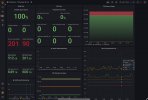I had an idea for an alternate method of getting the temp in the GUI (at least updated for the latest minute) and it seems to be working fine so far, but i'm new to PVE so what I'm doing may not be a great idea in the long run, I guess time will tell. Anyway.. I thought of using the node's Note section for a quick look at my temp.
in my example, my node is called "PVE" so the location of the notes is in the "config" file in /etc/pve/nodes/{nodename}/ or in my case "/etc/pve/nodes/pve/config"
I installed and ran the detect for lm-sensors: "apt-get install lm-sensors" then "sensors-detect"
then running "sensors" at shell gives me the temps.
I added a note to my node and saw that it was prefixed by a # in the config file so I added a cron job to run every minute as so:
* * * * * echo "#$(sensors | grep "Package")" > /etc/pve/nodes/pve/config
now every minute my node notes get updated with my current temp. I can quickly click on notes to see current temp (well as at last minute).
this wont work for everyone as I don't know what else might be in that file and I'm essentially replacing the whole config file with my one line note but as mine didn't have anything else in it anyway it didn't matter to me. this is where I'm sure that some staff person will come in and advise against it in case you make a change that adds something else to the config file it will just be written out of the file within a minute and could cause issues etc etc.
try it in a non-prod environment. make sure there is nothing in your config file before doing it. if you don't have a config file then go to the notes and edit them add a single line "test" or something like it then check again. for my home setup this works.
-update-
Did a little more thinking and came up with a better command which should alleviate some of the problems discussed above.
now using this command in my cron job:
* * * * * sed -i "s/.*Package.*/#$(sensors | grep "Package")/g" /etc/pve/nodes/pve/config
this now only replaces the line that contains Package but this could be made more specific should I need (or someone else who decides to use this method) leaving any other comments or any other settings that might be in the file alone.
in my example, my node is called "PVE" so the location of the notes is in the "config" file in /etc/pve/nodes/{nodename}/ or in my case "/etc/pve/nodes/pve/config"
I installed and ran the detect for lm-sensors: "apt-get install lm-sensors" then "sensors-detect"
then running "sensors" at shell gives me the temps.
I added a note to my node and saw that it was prefixed by a # in the config file so I added a cron job to run every minute as so:
* * * * * echo "#$(sensors | grep "Package")" > /etc/pve/nodes/pve/config
now every minute my node notes get updated with my current temp. I can quickly click on notes to see current temp (well as at last minute).
this wont work for everyone as I don't know what else might be in that file and I'm essentially replacing the whole config file with my one line note but as mine didn't have anything else in it anyway it didn't matter to me. this is where I'm sure that some staff person will come in and advise against it in case you make a change that adds something else to the config file it will just be written out of the file within a minute and could cause issues etc etc.
try it in a non-prod environment. make sure there is nothing in your config file before doing it. if you don't have a config file then go to the notes and edit them add a single line "test" or something like it then check again. for my home setup this works.
-update-
Did a little more thinking and came up with a better command which should alleviate some of the problems discussed above.
now using this command in my cron job:
* * * * * sed -i "s/.*Package.*/#$(sensors | grep "Package")/g" /etc/pve/nodes/pve/config
this now only replaces the line that contains Package but this could be made more specific should I need (or someone else who decides to use this method) leaving any other comments or any other settings that might be in the file alone.
Last edited:



